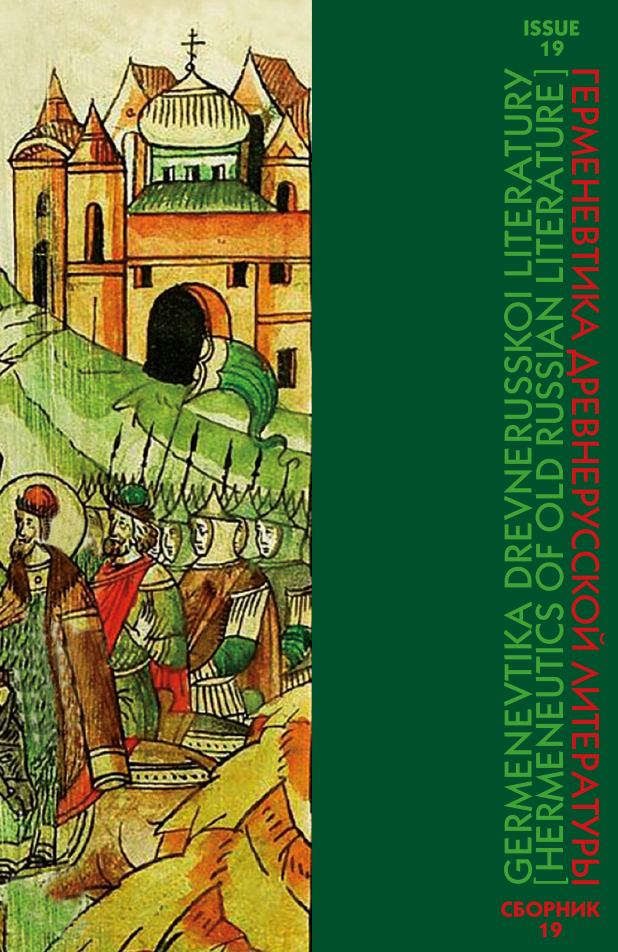Abstract:
The purpose of the article is to identify the specifics of the parable’s genre form in the Temporary by Ivan Timofeev. Among the full-text “parables- narrations” in the text we can distinguish parables-stories, parables-reflections, parables-instructions. The parables-stories (The Parable of the Tsar’s Roman Son ... and two parables about the widowhood of the Muscovy) are distinguished by a developed plot and represent vital examples told in order to edify and clarify the author’s attitude to historical events and persons. All parables have a two- part structure. The first part is a plot, the second is an interpretation. The technique of abstraction is appeared in the absence of a portrait and nature in many of the characters and in the absence of the historical and geographical realities. At the same time, didacticism is skillfully combined with amusement. For example, in The Parable of the Tsar’s Roman Son... the plot is entertaining with an element of the miraculous, there are elements atypical for the “classical” genre form: various kinds of the motivation for the characters’ actions, as well as a conventional portrait. The second part in the parables-stories is an interpretation that doesn’t contain a detailed disclosure of the allegory, and a prayer to the Lord, returning to the events of the Time of Troubles. An intermediate position between “parables-narrations” and “parables-maxims” is occupied by the parable of two friends. Being an example from life in content, it is close in form to apothegms. The interpretation of the plot situation is not singled out in a parable-reflection in a separate part, it is organically woven into the plot, drawing in the potential possibility of the events development. The plot of the parable about simple natural affairs reminds the instruction of how a person should act when he wants to travel to some city or another country. A laconic interpretation testifies to the fact that the parable-instruction about the completion of the path is applicable, according to Timofeev, to the creative process of writing a historical essay. In general, the parables scattered in many fragments of the text, given in full or only indicated, are a kind of companions that help not only create an extensive historical work, but also comprehend the unusual events of the Time of Troubles.
References:
- Biblioteka literatury Drevnei Rusi [Library of the Literature of Old Russia]. Vol. 4: XII vek (12th century). St. Petersburg, Nauka Publ., 2004. 685 p. (In Russian)
- Bogdanov, V.A. Tvorcheskaia priroda khudozhestvennogo obraza [The Creative Nature of the Artistic Image]. Moscow, Izdatel’stvo “Prometei” MGPI im. V.I. Lenina Publ., 1989. 150 p. (In Russian)
- Vremennik Ivana Timofeeva [The Temporary by Ivan Timofeev], prepared to print, trans. and comments. by O.A. Derzhavina, ed. Corresponding Member of the USSR Academy of Sciences V.P. Adrianova-Peretz. Reprinted reproduction of the 1951 edition. St. Petersburg, Nauka Publ., 2004. 509 p. (In Russian)
- Derzhavina, O.A. “D’iak Ivan Timofeev i ego ‘Vremennik’.” [“Clerk Ivan Timofeev and his ‘Temporary’.”]. Vremennik Ivana Timofeeva [The Temporary by Ivan Timofeev], prepared to print, trans. and comments. by O.A. Derzhavina, ed. Corresponding Member of the USSR Academy of Sciences V.P. Adrianova-Peretz. Reprinted reproduction of the 1951 edition. St. Petersburg, Nauka Publ., 2004, pp. 351–409. (In Russian)
- Dobrotvorskii, S. “Pritcha v drevnerusskoi dukhovnoi pis’mennosti” [“A Parable in Old Russian Spiritual Writing”]. Pravoslavnyi sobesednik [Orthodox Interlocutor], no. 3. Kazan’, 1864, pp. 375–415. (In Russian)
- Drevnerusskaia pritcha [Old Russian Parable], comp. N.I. Prokofiev, L.I. Alekhine; prepare text and comments. by L.I. Alekhina; foreword N.I. Prokofiev. Moscow, Sovetskaia Rossiia Publ., 1991. 528 p. (In Russian)
- Kolesov, V.V. “Aforistika Drevnei Rusi” [“Aphoristics of Old Russia”]. Mudroe slovo Drevnei Rusi (XI–XVII vekov) [Wise Word of Old Russia (11–17 centuries)], comp., introd., prepare texts, trans. and comments. V.V. Kolesov. Moscow, Sovetskaia Rossiia Publ., 1989, pp. 5–22. (In Russian)
- Kuskov, V.V. Zhanry i stili drevnerusskoi literatury XI–XVII vekov: avtoref. dis. … d-ra filol. nauk [Genres and Styles of Old Russian Literature of the 11th–17th Centuries: PhD thesis, summary]. Leningrad, 1978. 36 p. (In Russian)
- Likhachev, D.S. “Slavianskie literatury kak sistema” [“Slavic Literature as a System”]. Slavianskie literatury. VI Mezhdunarodnyi s”ezd slavistov (Praga, avgust 1968). Doklady sovetskoi delegatsii [Slavic Literature. VI International Congress of Slavists (Prague, August 1968). Reports of the Soviet delegation]. Moscow, Nauka Publ., 1968, pp. 5–48. (In Russian)
- Prokof ’ev, N.I. “Drevnerusskie pritchi i ikh mesto v zhanrovoi sisteme literatury russkogo srednevekov’ia” [“Old Russian Parables and Their Place in the Genre System of the Literature of the Russian Middle Ages”]. Literatura Drevnei Rusi [Literature of Old Russia]. Moscow, MGPI Publ., 1988, pp. 3–16. (In Russian)
- Romodanovskaya, E.K. “Drevnerusskaia pritcha: samoopredelenie zhanra” [“Old Russian Parable: Self-determination of the Genre”]. Krugi vremen: V pamiat’ Eleny Konstantinovny Romodanovskoi [Circles of Times: In Memory of Elena Konstantinovna Romodanovskaya]. Vol. 1: E.K. Romodanovskaia. Izbrannoe. Otkliki [E.K. Romodanovskaya. Favorites. Feedback]. Moscow, Indrik Publ., 2015. 872 p., ill. (In Russian)
- Romodanovskaya, E.K. “Ot tsitaty k siuzhetu. Rol’ povesti-pritchi v stanovlenii novoi russkoi literatury” [“From Quote to Plot. The Role of the Story-parable in the Formation of New Russian Literature”]. Problemy istoricheskoi poetiki, issue 3, 1994, pp. 66–75. (In Russian)
- Romodanovskaya, E.K. “Spetsifika zhanra pritchi v drevnerusskoi literature” [“Specificity of the Genre of Parables in Old Russian Literature”]. Problemy istoricheskoi poetiki, issue 5, 1998, pp. 73–111. (In Russian)
- Tufanova, O.A. “Kontseptsiia istoricheskogo povestvovaniia vo ‘Vremennike’ Ivana Timofeeva” [“The Concept of Historical Narration in ‘The Temporary’ by Ivan Timofeev”]. Drevniaia Rus’: Prostranstvo knizhnogo slova. Istoriko-filologicheskie issledovaniia [Old Russia: Space of the Book Word. Historical and Philological Research], ex. ed. V.M. Kirillin. Moscow, Iazyki slavianskoi kul’tury Publ., 2015, pp. 351–369. (In Russian)






